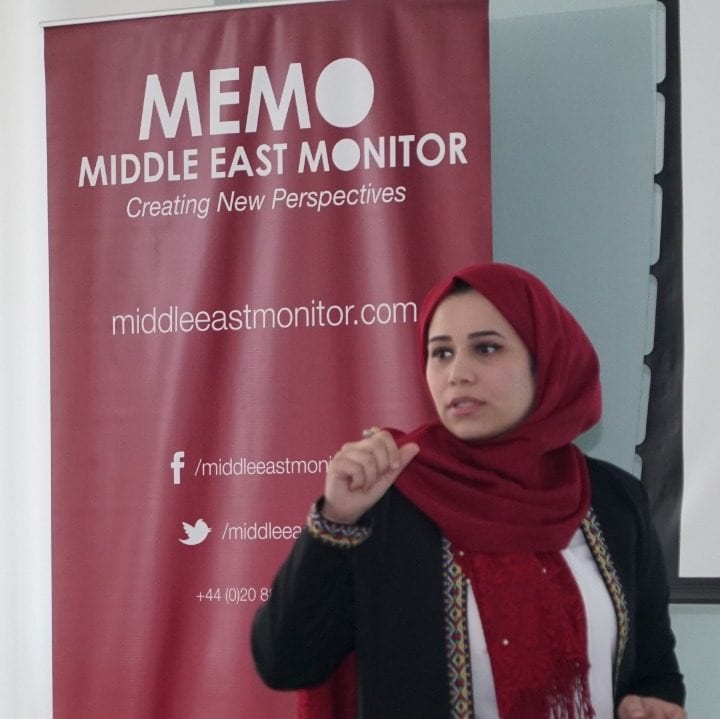In just three words, Al Jazeera’s correspondent in Gaza set social media buzzing: “The tower collapsed.” That was how Wael Al-Dahdouh announced to the world that the tower block housing Al Jazeera and other media offices had been bombed by Israel and was coming down. He is well known to the Palestinians for his coverage of the Israel offensive last month and every other time that the occupation state has attacked the largely civilian population.
Al-Dahdouh grew up in the eastern Gaza Strip town of Al-Zeitoun in a large, conservative family that still cultivates the land. He dreamed of being a doctor and had the academic grades to do it, but the events of the First Intifada (1987-1993) changed all of that.
“I was arrested by the Israeli occupation forces and sentenced to seven years in prison for participating in the Intifada against the occupier,” he told me.
The challenging environment in prison taught him resilience, creativity, and skills, and developed the characteristics for which the ambitious Palestinian is known.
READ: Hamas denies Israel’s claim it had offices in AP building in Gaza
“I benefited a lot from the prison. It turned me from a hasty, enthusiastic, and simple boy to a conscious, educated man aware of many life issues. This distinguished me from friends of the same age.” He chuckled at the irony. “Prison can be a paradise if the prisoner makes good use of his time. This ensures that Israel fails to achieve its goals when locking us up.”
After his release, Al-Dahdouh tried to complete his studies outside the Gaza Strip, but the occupation forces prevented him from leaving, so he studied at a university close to home. “I decided to study journalism because there was no medical faculty in Gaza at that time. I also found journalism to be the closest to my personality, with the message that journalists should convey under the shadow of the occupation.”
After graduating, Al-Dahdouh worked in different newspapers and media channels. He joined Al Jazeera in 2004 and has headed its office in Gaza ever since.

Journalists in Gaza [Wael Al-Dahdouh]
When the Israelis bombed the 12-storey building housing Al Jazeera, Associated Press, and other media offices on 15 May, journalists knew that they were now the target. Not only did they cover the news, but they were also part of it.
Al-Jalaa Tower was not the only high-rise block hit by Israeli bombs. According to the Palestinian Journalists’ Syndicate, 21 media organisations had their facilities destroyed by airstrikes in Gaza. “If Israel wanted to obstruct media coverage of its attack, it was mistaken,” explained Al-Dahdouh. “It did not succeed. If anything, it attracted even more attention because in hitting Al Jazeera it also attacked Associated Press, an American bureau.” Pressure was, therefore, applied from the US.
The Syndicate pointed out that Israel has violated the rights of Palestinian journalists and cameramen during their work on almost 500 occasions since the beginning of last year. Every year, it said, there are between 500 and 700 attacks by Israeli occupation forces against its members. The violations come in many forms: killing, arrests, tear gas, and rubber bullets, and the destruction of media facilities. Almost 50 Palestinian journalists have been killed since 2000 in the course of their work. Several journalists have been injured, arrested, or attacked in Jerusalem and Gaza over the past few weeks alone.
![Wael Al-Dahdouh is during the media coverage of the last war on Gaza, May 2021 [Wael Al-Dahdouh]](https://i0.wp.com/www.middleeastmonitor.com/wp-content/uploads/2021/06/2.jpeg?resize=960%2C720&ssl=1)
Wael Al-Dahdouh is during the media coverage of the last war on Gaza, May 2021 [Wael Al-Dahdouh]
READ: Israel’s crackdown on journalists slammed by major international press association
“It is hard to concentrate on the task at hand sometimes,” he concluded, “because we are not reporting on a war in a foreign land. The bombs are dropping on our homes and offices. Staying focused isn’t easy when you stop to wonder if anyone near to you has been killed or wounded.”
The fact that the Al Jazeera journalist and his colleagues still produce dramatic coverage despite the challenges is down to their professionalism and courage. Long may they continue to do so.


![Wael Al-Dahdouh is during the media coverage of the last war on Gaza, May 2021 [Wael Al-Dahdouh]](https://i0.wp.com/www.middleeastmonitor.com/wp-content/uploads/2021/06/cover.jpeg?fit=960%2C640&ssl=1)









